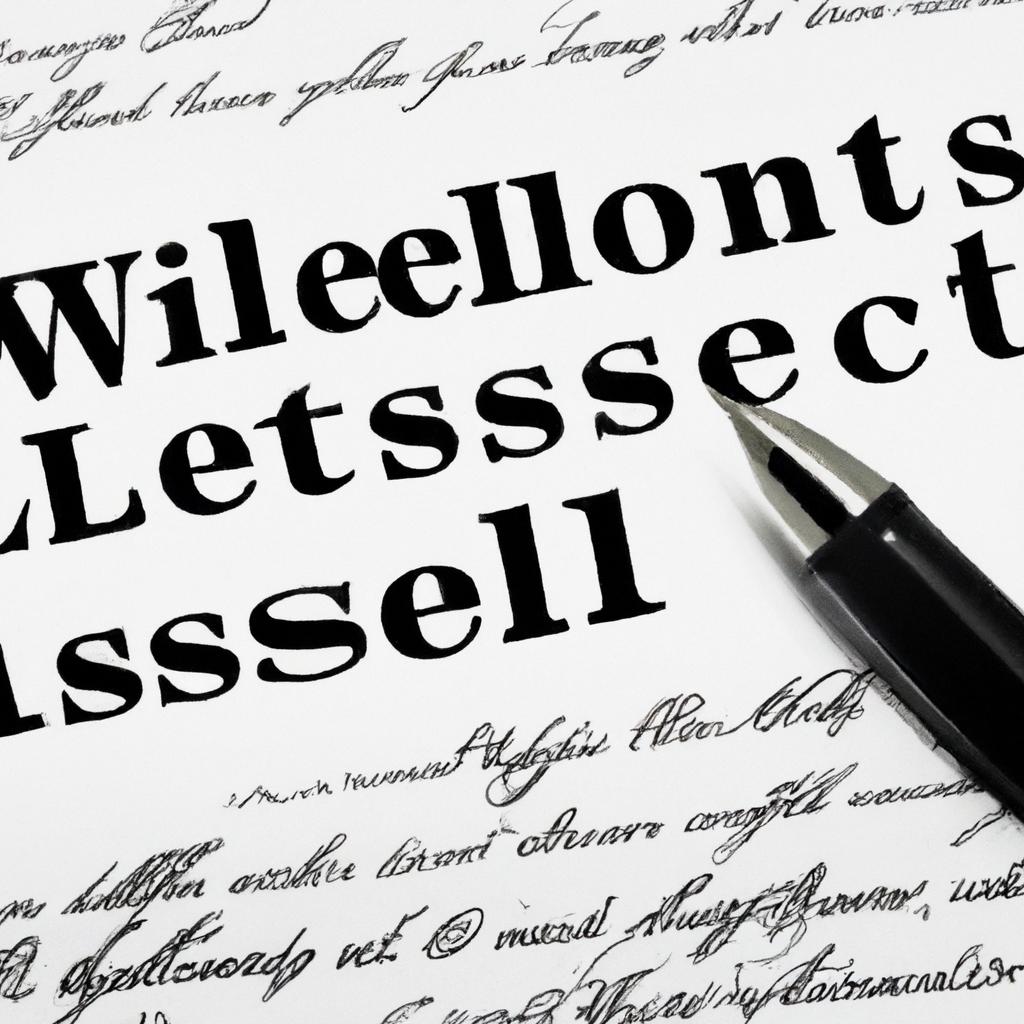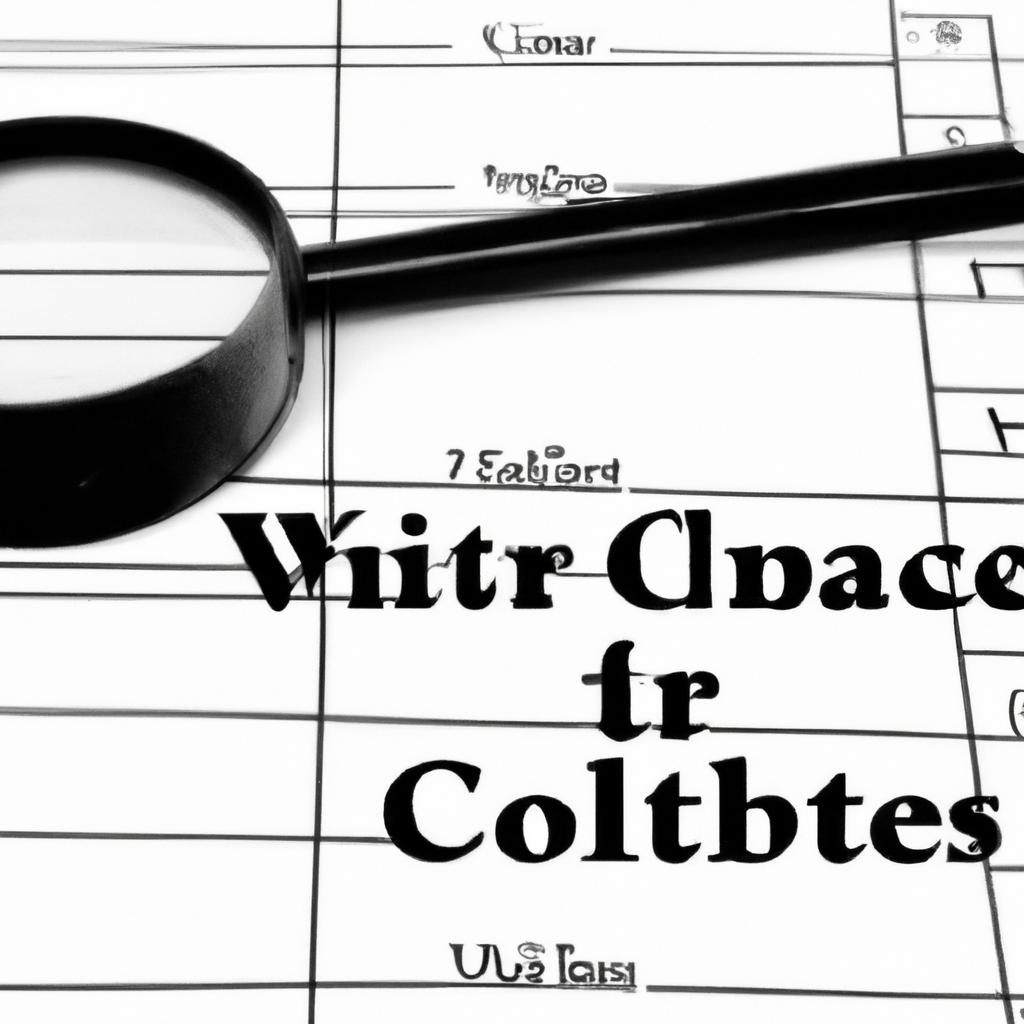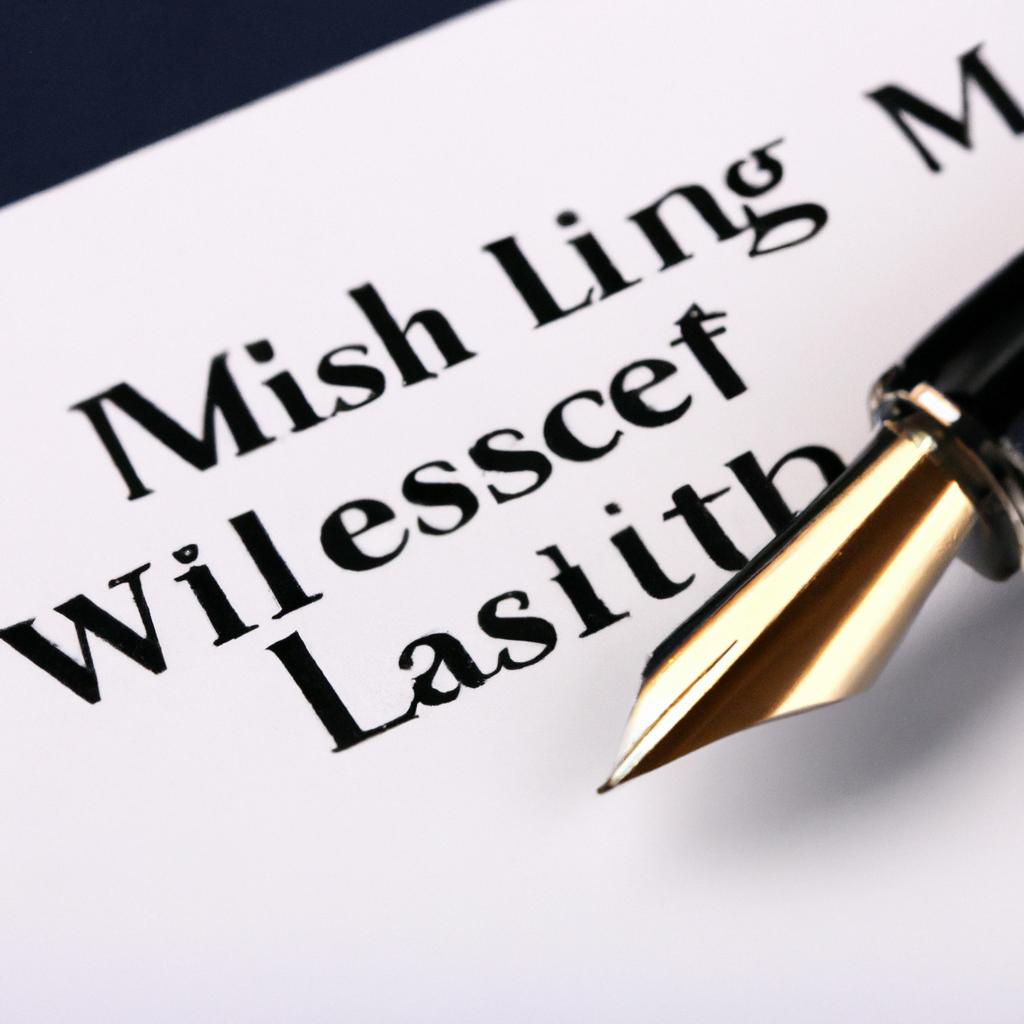In the intricate web of legal matters surrounding estate planning and probate, the location of a filed will is a crucial piece of information. As experienced lawyers at Morgan Legal Group, based in the bustling metropolis of New York City, we understand the importance of knowing where a will is filed. Whether you are seeking to locate a loved one’s will or ensuring that your own testamentary wishes are properly documented, navigating the complex process of finding a filed will is a task that requires attention to detail and legal expertise. Let us guide you through the steps of unraveling this essential mystery in the realm of Wills and trusts.
Locating a Decedent’s Will: Understanding the Process
When it comes to locating a decedent’s will, there are specific steps that need to be followed in order to ensure that the process is carried out smoothly and efficiently. Understanding the process of finding a will is crucial in order to properly administer the estate and distribute the deceased’s assets according to their wishes.
One of the first steps in locating a decedent’s will is to check with the local probate court in the area where the deceased resided. The will is typically filed with the probate court after the individual passes away. If the will has been filed, it should be accessible to the public for viewing. Additionally, it is important to check with the deceased’s estate planning attorney, as they may have a copy of the will on file. Other potential sources for locating a will include contacting the deceased’s financial institutions, safe deposit box providers, or checking for any home safes or personal files where the will may have been stored.

Navigating the Probate Court System for Will Searches
To successfully navigate the probate court system for will searches, it is crucial to understand the specific steps involved in locating a filed will. The process can vary depending on the jurisdiction, but generally involves the following key steps:
- Begin by identifying the deceased individual’s last known residence.
- Research the probate court in that jurisdiction to determine where the will may have been filed.
- Request access to the court’s records, which may include online databases, physical files, or microfilm records.
- Review any available information to locate the filed will, such as the deceased’s full name, date of death, and other identifying details.
In some cases, it may be necessary to engage the services of a probate attorney to assist with the will search process. An experienced legal professional can provide valuable guidance and support in navigating the complexities of probate court procedures. Ultimately, with diligence and persistence, it is possible to locate a filed will and proceed with the necessary legal steps to ensure the deceased’s wishes are carried out according to their last testament.
Utilizing Public Records and Online Resources for Will Retrieval
One effective way to locate a filed will is by utilizing public records and online resources. Public records such as county clerk’s offices, probate courts, and state archives can provide valuable information regarding the filing of a will. By visiting these locations or accessing their online databases, individuals can search for wills based on the decedent’s name, date of death, and other identifying details.
Additionally, online resources such as the National Will Registry or websites of estate planning attorneys may also contain information about filed wills. These resources can help streamline the search process and provide access to wills that may not be readily available through traditional public records. By leveraging both public records and online resources, individuals can increase their chances of successfully locating a filed will and ensuring that the decedent’s final wishes are carried out accordingly.
Seeking Professional Legal Assistance in Finding a Missing Will
When it comes to finding a missing will, seeking professional legal assistance is crucial in navigating the complex legal process. Our experienced team at Morgan Legal Group in New York City is here to help you uncover the whereabouts of a missing will and ensure that your loved one’s final wishes are carried out.
With our expertise in estate planning and probate law, we can assist you in locating a missing will through the following methods:
- Conducting a thorough search of the deceased’s personal records and safe deposit boxes.
- Reaching out to the deceased’s attorney or financial advisors for any information regarding the will.
- Filing a petition with the probate court to declare the will lost and proceed with administering the estate.
Q&A
Q: Where can I find information on where a will is filed?
A: The first step in locating a filed will is to contact the local probate court in the deceased person’s county of residence. They will have a record of all filed wills within their jurisdiction.
Q: Is there a way to search for a will online?
A: Some probate courts may offer online search tools to help locate filed wills. Alternatively, there are third-party websites that specialize in locating and providing copies of filed wills for a fee.
Q: What information will I need to provide to locate a will?
A: You will typically need to provide the full name of the deceased person, their date of death, and their last known address. Having additional information such as their social security number or date of birth can also be helpful in locating the filed will.
Q: How long does it usually take to find a filed will?
A: The time it takes to locate a filed will can vary depending on the availability of online search tools, the workload of the probate court staff, and the complexity of the case. In some cases, it can be located in a matter of days, while in others it may take several weeks.
Q: What should I do if I am unable to locate a filed will?
A: If you are unable to locate a filed will, you may want to consider hiring a probate attorney to assist you in your search. They can help navigate the legal process and work with the probate court to locate the necessary documents.
In Conclusion
In conclusion, locating a will can sometimes feel like searching for a needle in a haystack, but with the right resources and guidance, the process can be made much easier. Remember to start by checking with the individual’s lawyer, local probate court, and state registry of wills. If all else fails, hiring a professional will locator may be worth considering. Regardless of the method you choose, persistence and patience are key in finding the document that could hold important information for you and your loved ones. Good luck on your search!
 When a family member or loved one passes away, it is natural to wonder about their will and what will happen to their assets and belongings. However, sometimes it can be challenging to find out where a will is filed. This can create confusion and delays in the distribution of assets, causing added stress during an already difficult time. In this article, we will discuss how to find out where a will is filed and simplify the process for you.
When a family member or loved one passes away, it is natural to wonder about their will and what will happen to their assets and belongings. However, sometimes it can be challenging to find out where a will is filed. This can create confusion and delays in the distribution of assets, causing added stress during an already difficult time. In this article, we will discuss how to find out where a will is filed and simplify the process for you.
What is a Will?
Before diving into the process of finding a will, let’s first understand what a will is. A will, also known as a Last Will and Testament, is a legal document that outlines how a person’s assets and belongings will be distributed after their death. It may also include instructions for guardianship of minor children, funeral arrangements, and other important matters. A will is typically prepared by the individual while they are alive and is executed upon their death.
Why do I Need to Find a Will?
Finding a will is crucial because it helps determine the wishes of the deceased regarding their assets and provides guidance for the distribution of those assets to heirs and beneficiaries. If there is no will, state laws will dictate how the assets will be distributed, which may not align with the individual’s wishes.
Ways to Find Out Where a Will is Filed
There are several ways to find out where a will is filed. Some of these methods include:
1. Ask Family and Friends
One of the most straightforward ways to find out where a will is filed is to ask close family members or friends. They may have knowledge of the whereabouts of the will or know someone who does. It is essential to reach out to those who are close to the deceased as they may have been mentioned in the will and could be involved in its execution.
2. Check with the Probate Court
If you are unable to locate the will through family and friends, the next step is to check with the probate court in the county where the deceased resided. A probate court deals with the administration of estates and trusts, including the validation of wills. The court will have a copy of the will if it has been filed for probate. You can visit the probate court’s website and search for the individual’s name to see if they have a will on file.
3. Contact the Attorney Who Drafted the Will
If you know who drafted the will, you can reach out to them directly. They will have a copy on file, and it is a standard practice for attorneys to keep their clients’ wills in a safe place. If you do not know who drafted the will, you can reach out to local attorneys and ask if they have any information. You can also check the deceased’s financial documents for the attorney’s contact information.
4. Search at the deceased’s residence
Sometimes, a person may keep their will at home in a safe or a designated folder. It is worth searching their residence, including any safe deposit boxes, for a copy of the will. If you find a will, make sure to check if it is the original or a copy. The original is typically signed and witnessed, while a copy may not be.
5. Hire a Private Investigator
If all else fails, you can consider hiring a private investigator to locate the will for you. They will have access to databases and resources that can help track down the will. However, this option can be expensive, so it should be considered as a last resort.
What to Do After Finding the Will
Once you have located the will, you should take certain steps to ensure its safekeeping and proper execution. These steps include:
1. Informing the Executor
The executor is the person responsible for carrying out the wishes of the deceased as outlined in the will. Once you have found the will, it is essential to inform the executor. They will be responsible for filing the will with the court and initiating the probate process.
2. Filing the Will
As mentioned earlier, the will needs to be filed with the probate court for it to be validated. The executor of the will usually takes care of this step. They will also provide copies of the will to all beneficiaries and heirs.
3. Reviewing the Will with an Attorney
To ensure that the will is executed correctly, it is advisable to review it with an experienced attorney. They will be able to answer any questions and provide guidance on how to proceed with the administration of the estate.
Conclusion
Finding out where a will is filed is essential to ensure that the wishes of the deceased are carried out. It can be a challenging and emotional task, but with the steps outlined in this article, it should become more manageable. It is also essential to remember that the process may take some time, so it is crucial to be patient and communicate with all involved parties. In case you run into any obstacles, do not hesitate to seek the help of a professional attorney who can guide you through the process smoothly.

